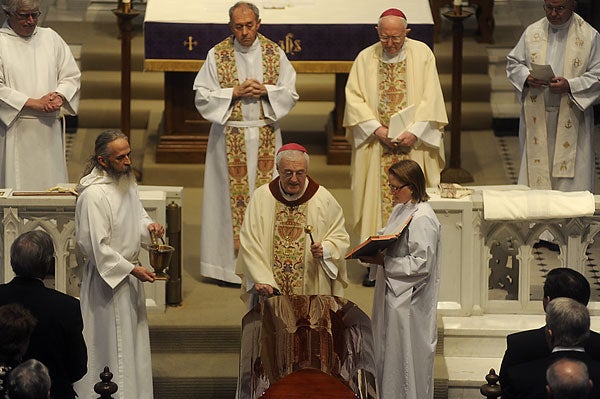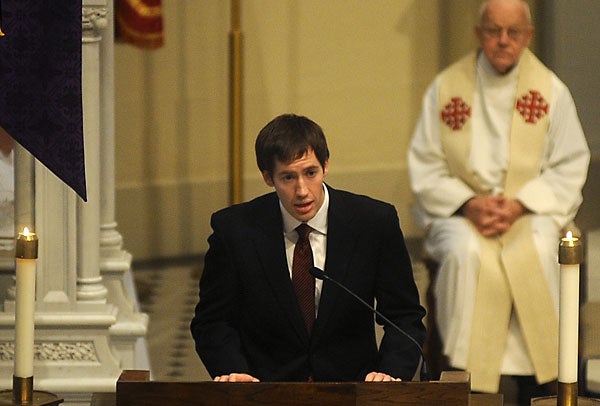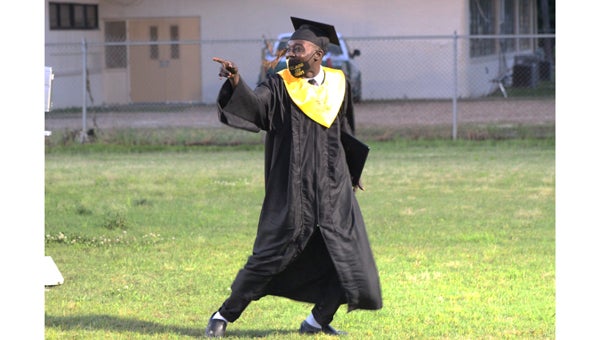Allain family, friends remember former governor at service
Published 12:01 am Sunday, December 8, 2013

Brittney Lohmiller / The Natchez Democrat — Members of the Knights of Columbus 4th degree honor guard stand at attention while pall bearers move Bill Allain’s casket into St. Mary Basilica Saturday afternoon. Allain, a Natchez native, served as Mississippi’s attorney general from 1980 to 1984 and as the 59th governor from 1984 to 1988. Allain died Dec. 2 at age 85.
NATCHEZ — Family and friends of former Mississippi Gov. Bill Allain gathered Saturday at St. Mary Basilica to celebrate the life of a man who is remembered as a humble public servant with a heart for helping those in need.
Bishop William Houck said at the Mass of Christian Burial that he became bishop of the diocese in Jackson the same year Allain, a Natchez native, entered the governor’s office in 1984.
Houck said Allain, 85, faithfully attended the Cathedral of St. Peter and visited the rectory on Sundays after early mass for coffee and a chat during Allain’s time in Jackson.
“Although he could be a strong man, he was a humble and selfless man,” Houck said. “We all need to learn to be humble. In order to be a servant, and he was a servant, serving our state, our country, it takes humility, courage and it takes great character.”
- Brittney Lohmiller / The Natchez Democrat — Lane Murray, Natchez native and friend to Allain, places his boutonniere on Allain’s casket at the Natchez City Cemetery.
- Brittney Lohmiller / The Natchez Democrat — Reverend Joseph N. Latino sprinkles Holy Water on Allain’s casket at the beginning of Allain’s funeral at St. Mary Basilica in Natchez
- Brittney Lohmiller / The Natchez Democrat — Alex Allain, the great nephew of former Mississippi Gov. Bill Allain, reads Romans 5: 5-11 during Allain’s funeral at St. Mary Basilica in Natchez.
Allain’s family members draped a pall, a large white cloth symbolizing the baptismal garment given at baptism, over his coffin at the beginning of the ceremony, which lasted a little less than an hour.
Father David O’Connor said Allain was baptized March 18, 1978, in St. Mary Basilica by Father John McNamara.
Alex Allain, great nephew, read a passage from St. Paul’s letter to the Romans.
“Hope does not disappoint, because the love of God has been poured out into our hearts through the Holy Spirit who has been given to us,” he said. “For Christ, while we were still helpless, died at the appointed time for the ungodly. Indeed, only with difficulty does one die for a just person, though perhaps for a good person one might even find courage to die. But God proves his love for us in that while we were still sinners, Christ died for us.”
O’Connor said he did not personally know Allain, but added his legacy speaks to Allain’s character and faith.
“He had a heart for the people of Mississippi and he worked hard,” O’Connor said. “And he had a heart for those who needed help.”
O’Connor said perhaps one of the best ways Allain’s family and friends can honor him is by remaining close and tied together by the bond they shared with Allain.
“And retell the stories of his life to keep his spirit in our midst,” O’Connor said.
Allain was laid to rest in the Natchez City Cemetery with a six-gun salute.
Allain was a Democrat who appointed significant numbers of women and minorities to government jobs and strengthened the executive branch by removing legislators from state boards.
He was the first Mississippi governor in modern times who could have run for a second consecutive term after the ban on gubernatorial succession was lifted in 1986, but he chose not to seek re-election. After leaving office, Allain returned to private law practice and rarely participated in events with other former governors.
Before being elected attorney general, Allain worked 12 years on the attorney general’s staff and had a role in most of Mississippi’s major federal cases of the era. In 1962, his first year as an assistant attorney general, Allain represented the state as Gov. Ross Barnett tried to block James Meredith from enrolling as the first black student at the University of Mississippi.
Allain was among the first lawyers to represent the state in a prison crowding case and the Ayers college desegregation case, both dating from the 1970s. As an assistant attorney general and in his private law practice, Allain built a network of acquaintances that helped him win the attorney general’s race in 1979.








